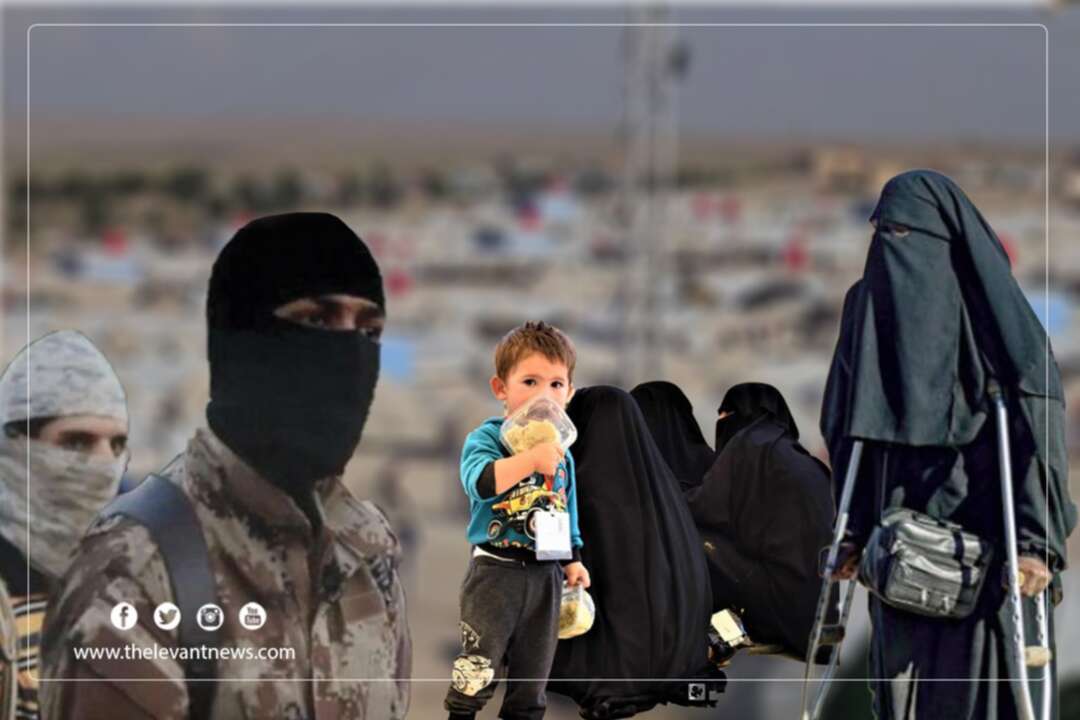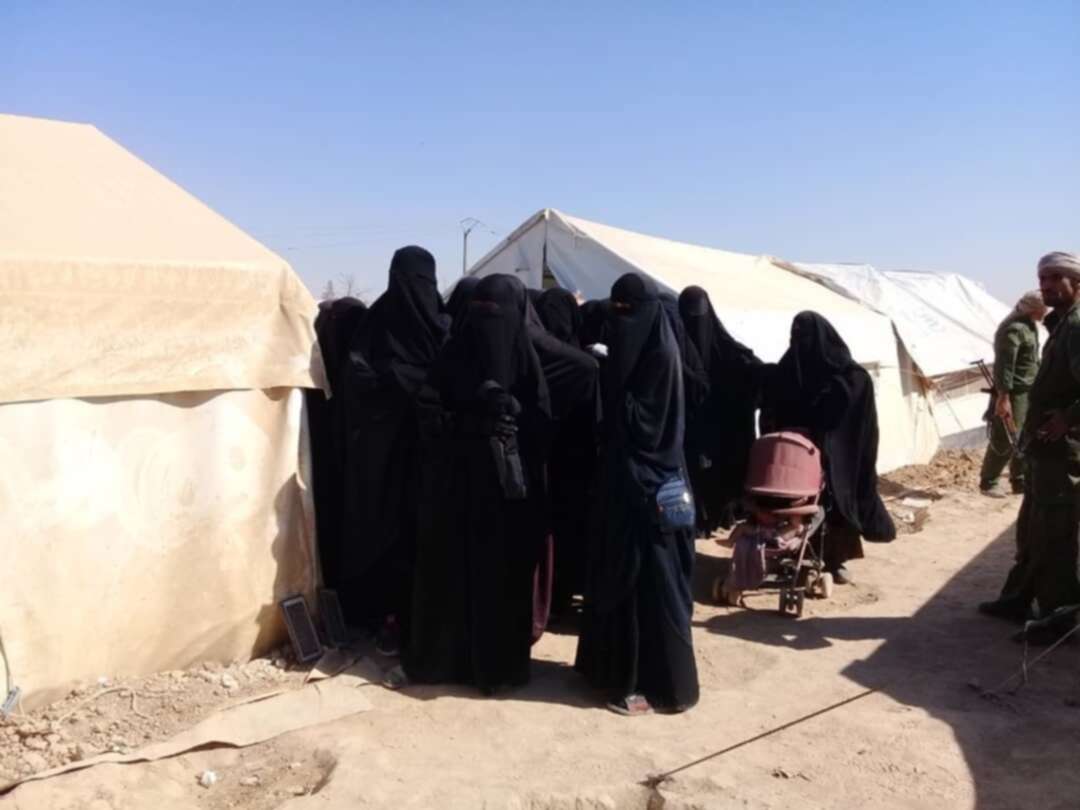-
Concerns over “Jihadists” ties to ISIS in Al-Hawl - French families

The Al-Hawl displacement camp in the city of Hasaka, Syria witnessed the murders of six people in May 2022 alone. These deaths increased the number of documented murders in the camp to a total of 24 since the beginning of the year, and the mysterious January 2022 killing of an aid worker in Al-Hawl posed an unprecedented threat to the humanitarian and medical organizations working to assist the more than eight thousand female jihadists and wives and widows of ISIS fighters living there.
More than 40,000 traveled to join the “Islamic State” in Iraq and Syria 2014 from 81 countries. Some fought in Iraq and Syria for ISIS, while others, including some women and their children, were victims of violence. Whether they came willingly or not, those who remain, some 64,000 from 57 countries, mostly women and children, live amid dire conditions that human rights groups have described as breeding grounds for future radicalization.
French “Jihadists”
France witnessed a wave of departures of its citizens to join ISIS, and France is more than any other country in Europe in the number of its citizens joining the organization. The French government demanded that its foreign nationals be tried in Syria or Iraq. But their experience locally has proven impossible, as the Iraqi and Syrian authorities have ruled out doing so. Paris, unlike its European neighbors, pursued a policy of returns sparingly. In a different approach, the French authorities announced the return of many of their nationals in July 2022, amid local and international pressures and criticism.
Overall, 2000 French citizens traveled to Iraq and Syria. Around 700 French foreign fighters remain in Syria, while another 270 French foreign fighters have returned home. Some of those still in Syria will inevitably look for opportunities to leave. While not all French foreign fighter returnees will engage in dangerous or threatening activities upon leaving Syria, some may radicalize others, plot attacks, and join or create extremist networks inside and outside of prisons.

The European court of human rights on 15th September 2022has condemned France over its refusal to repatriate French women who travelled to Syria with their partners to join Islamic State and are currently being held with their children at Kurdish-run prison camps.The ruling will be studied closely by other countries who still have citizens detained in camps in north-eastern Syria, including the UK
Change in France's approach
A change in France's approach to repatriating its nationals On July 5, 2022, France repatriated (16) women between the ages of 22 and 39 and (35) minors, of whom (7) returned without adult escorts in the largest group repatriated at once by France. (12) women returned with their children, while the other (4) agreed earlier for the return of their children. (8) Women were detained for interrogation; while (8) others were detained according to arrest warrants. The children were placed in the child care services attached to the Versailles Court of Justice. However, this position is contrary to the prevailing opinion on July 2, 2022, when about (70%) of the French in 2019 expressed their opposition to the return of the sons of jihadists.
What should be done?
Leaving European citizens in camps carries a greater risk than repatriating them, especially children and minors, because they may rejoin ISIS. And they may become “the next generation of foreign fighters.” The best solution to the dilemma of the return of foreign fighters is to allow their return and allow the returnees an opportunity to rehabilitate and reintegrate after determining the motives behind their joining the organization and the extent of their participation in combat operations fleeing conflict areas.
It is necessary to support the Syrian Democratic Forces, northern Syria (SDF) in order to manage Al-Hawl camp and other camps in northern Syria, which have become a source of threat to regional and international security.
By: Jassim Mohamad - Bonn
You May Also Like
Popular Posts
Caricature
BENEFIT Sponsors BuildHer...
- April 23, 2025
BENEFIT, the Kingdom’s innovator and leading company in Fintech and electronic financial transactions service, has sponsored the BuildHer CityHack 2025 Hackathon, a two-day event spearheaded by the College of Engineering and Technology at the Royal University for Women (RUW).
Aimed at secondary school students, the event brought together a distinguished group of academic professionals and technology experts to mentor and inspire young participants.
More than 100 high school students from across the Kingdom of Bahrain took part in the hackathon, which featured an intensive programme of training workshops and hands-on sessions. These activities were tailored to enhance participants’ critical thinking, collaborative problem-solving, and team-building capabilities, while also encouraging the development of practical and sustainable solutions to contemporary challenges using modern technological tools.
BENEFIT’s Chief Executive Mr. Abdulwahed AlJanahi, commented: “Our support for this educational hackathon reflects our long-term strategic vision to nurture the talents of emerging national youth and empower the next generation of accomplished female leaders in technology. By fostering creativity and innovation, we aim to contribute meaningfully to Bahrain’s comprehensive development goals and align with the aspirations outlined in the Kingdom’s Vision 2030—an ambition in which BENEFIT plays a central role.”
Professor Riyadh Yousif Hamzah, President of the Royal University for Women, commented: “This initiative reflects our commitment to advancing women in STEM fields. We're cultivating a generation of creative, solution-driven female leaders who will drive national development. Our partnership with BENEFIT exemplifies the powerful synergy between academia and private sector in supporting educational innovation.”
Hanan Abdulla Hasan, Senior Manager, PR & Communication at BENEFIT, said: “We are honoured to collaborate with RUW in supporting this remarkable technology-focused event. It highlights our commitment to social responsibility, and our ongoing efforts to enhance the digital and innovation capabilities of young Bahraini women and foster their ability to harness technological tools in the service of a smarter, more sustainable future.”
For his part, Dr. Humam ElAgha, Acting Dean of the College of Engineering and Technology at the University, said: “BuildHer CityHack 2025 embodies our hands-on approach to education. By tackling real-world problems through creative thinking and sustainable solutions, we're preparing women to thrive in the knowledge economy – a cornerstone of the University's vision.”
opinion
Report
ads
Newsletter
Subscribe to our mailing list to get the new updates!






















